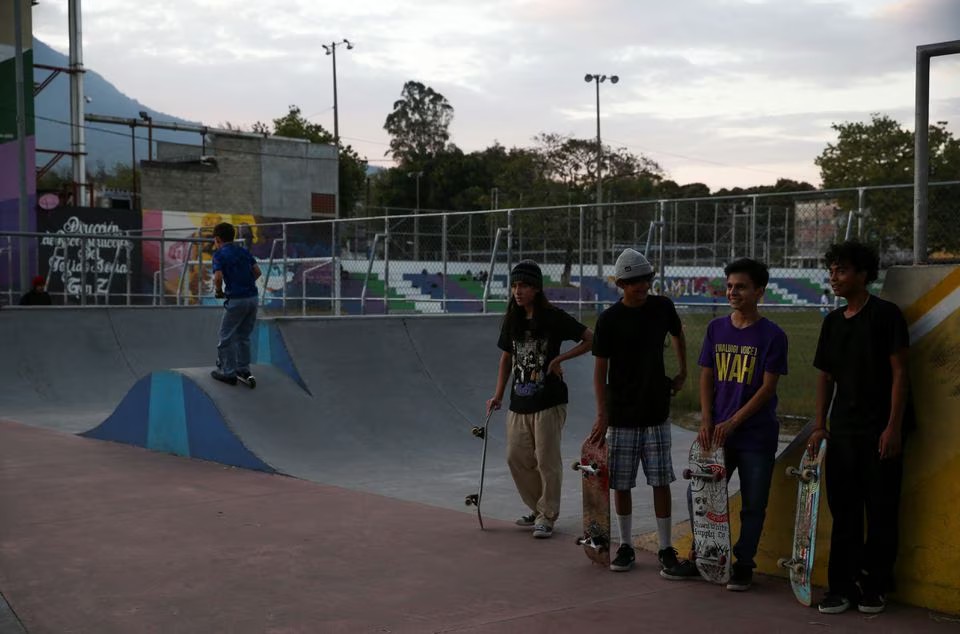SAN SALVADOR, (Reuters) – El Salvador’s state of emergency to combat gangs, which has widespread public support despite a growing prison population and allegations of human rights abuses, will be maintained until all criminals are captured, the country’s security minister told Reuters.
Since President Nayib Bukele asked the country’s congress to approve a state of exception in March last year, security forces have arrested more than 64,000 suspected gang members and associates. Authorities estimate they have around 10,000 more arrests to make and the measure has been regularly extended.
“As long as we have these murderers and these terrorists fleeing and escaping within the country, this measure must continue,” Security Minister Gustavo Villatoro said in an interview last week in his office in San Salvador.
He said Salvadoran authorities were working with counterparts in southern Mexico, Guatemala and the United States to find an unspecified number of gang members who had fled.
The crackdown on El Salvador’s notorious gangs has more than halved murders in one of the most crime-ridden countries in the Western hemisphere, drawing the interest of other nations struggling with gang violence and raising questions about what rights citizens are willing to exchange for living on safer streets.
With nearly 2% of its adult population behind bars, El Salvador has the highest incarceration rate in the world and recently inaugurated one of the region’s largest prisons, with a capacity for 40,000 inmates.
Under the state of emergency some constitutional rights have been suspended. Arrests can be made without a warrant, the government has unfettered access to private communications, and detainees’ rights to a lawyer have been shelved.
But the vast majority of people in El Salvador say they approve of the hard-line approach and feel safer. A survey this month by pollsters CID Gallup found that 92% of the population supports the state of exception.
In 2022 homicides fell 57% to 495, from 1,147 in 2021, according to government figures. Extortion, one of the gangs’ primary sources of income, has plummeted, many residents say. By August of last year, the transportation minister estimated bus companies had already saved around $50 million from not paying.
In Santa Tecla, a city just outside capital San Salvador, 45-year-old mechanic Manuel said he had paid extortion money for 12 years. Every two weeks he gave the money to hitmen from MS-13 who threatened to kill his wife and four children if he did not pay, and he was often forced to fix the gang’s cars for free. During Christmas he would pay double.
But since last July, no one has come to collect the payment, he said.
“I feel calmer, I can go for a walk. I go out to walk every night with my young children,” he told Reuters. “Before I didn’t even take them out.”
The results of the crackdown have led other countries in the region to consider similar policies, including Honduras, which implemented a pared-down version last December. El Salvador has also discussed offering support to Haiti, which has pleaded for help from the international community to end gang violence that has left much of its territory off-limits to the government.
Villatoro said El Salvador’s curbed rights were necessary to ensure security and would only be lifted when the security risk “reaches numbers close to zero.”
“The majority of Salvadorans have not been subjected to this suppression of rights,” he said.
But the widening of state authority in the name of security, for some analysts, is in-step with other strongman moves Bukele has made to centralize power. He has dissolved anti-corruption legal bodies, stacked the country’s top court with loyalists who immediately allowed for presidential re-election, and passed a sweeping law aimed at prohibiting journalists from writing about gangs.
Bukele has also built a communications juggernaut powered partly by paid internet trolls to hail his policies, especially on security, and attack those who raise human rights concerns.
Rights groups have documented hundreds of arbitrary arrests, torture, and the deaths of prisoners in state custody.
Human Rights Watch, citing leaked government data, has reported “mass due process violations” and said minors as young as 12 were being held in overcrowded prisons.
The government denies the accusations of torture and other rights abuses outside those allowed under the state of exception. Around 3,700 people who were considered to have been “coerced” by gangs into crimes had been released, Villatoro said.
“It doesn’t interest us to convict anyone unjustly,” he said.
For ten residents Reuters spoke to in neighborhoods around San Salvador once dominated by gangs the crackdown has transformed their lives for the better. They now can go outside at night, spend time at parks and soccer pitches, receive visitors from other parts of the city and even order fast food delivery – all unthinkable when the gangs roamed.
Alexander Guillen is a 24-year-old university student who is part of an artistic graffiti collective that now paints the walls where Barrio 18 tags once reigned.
“There is freedom that young people have to be able to perform, be it artistically, culturally, or in sports,” he said. “We have that freedom to be able to develop ourselves… to be able to use the public spaces in the neighborhood without any fear.”

